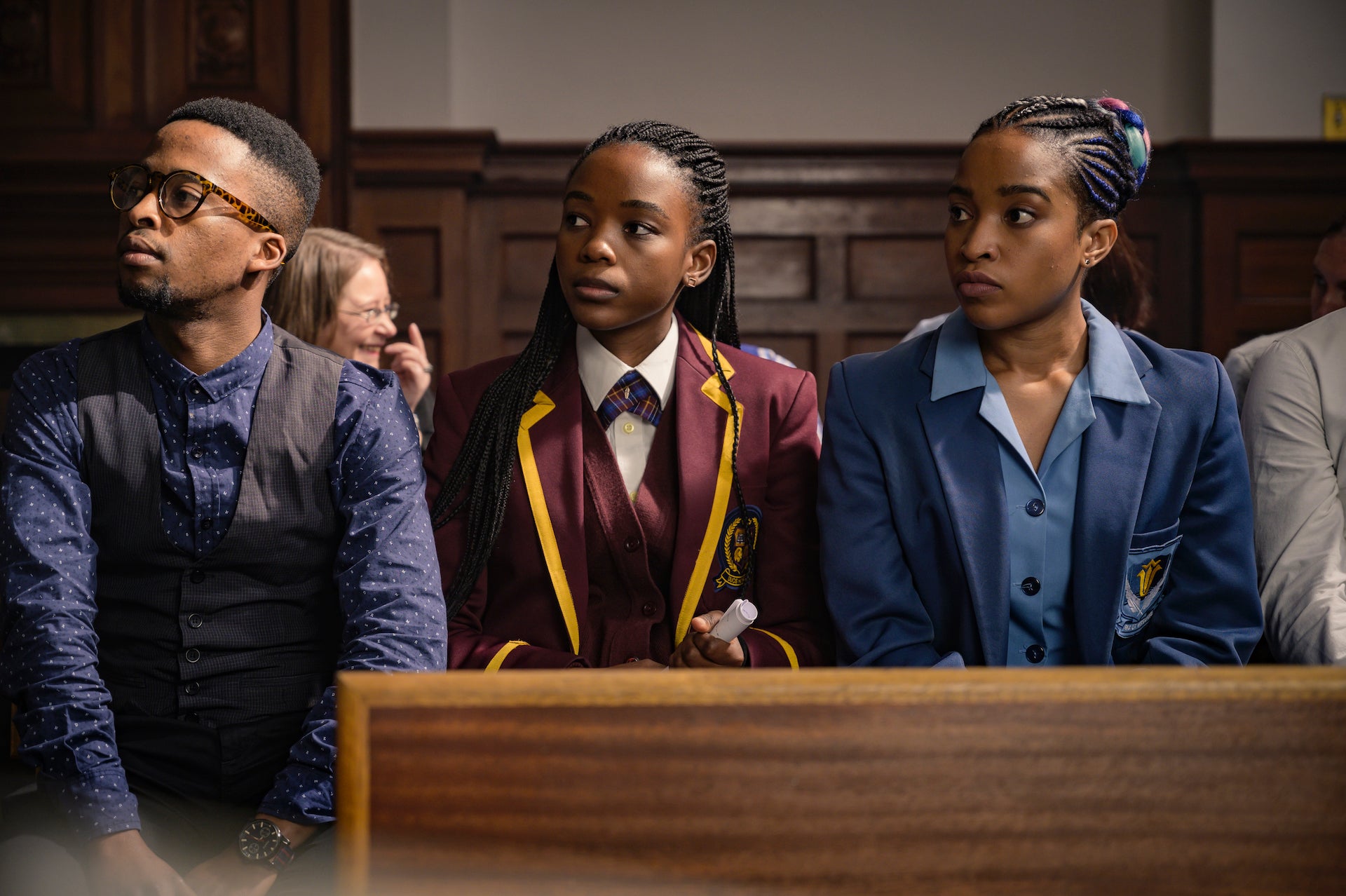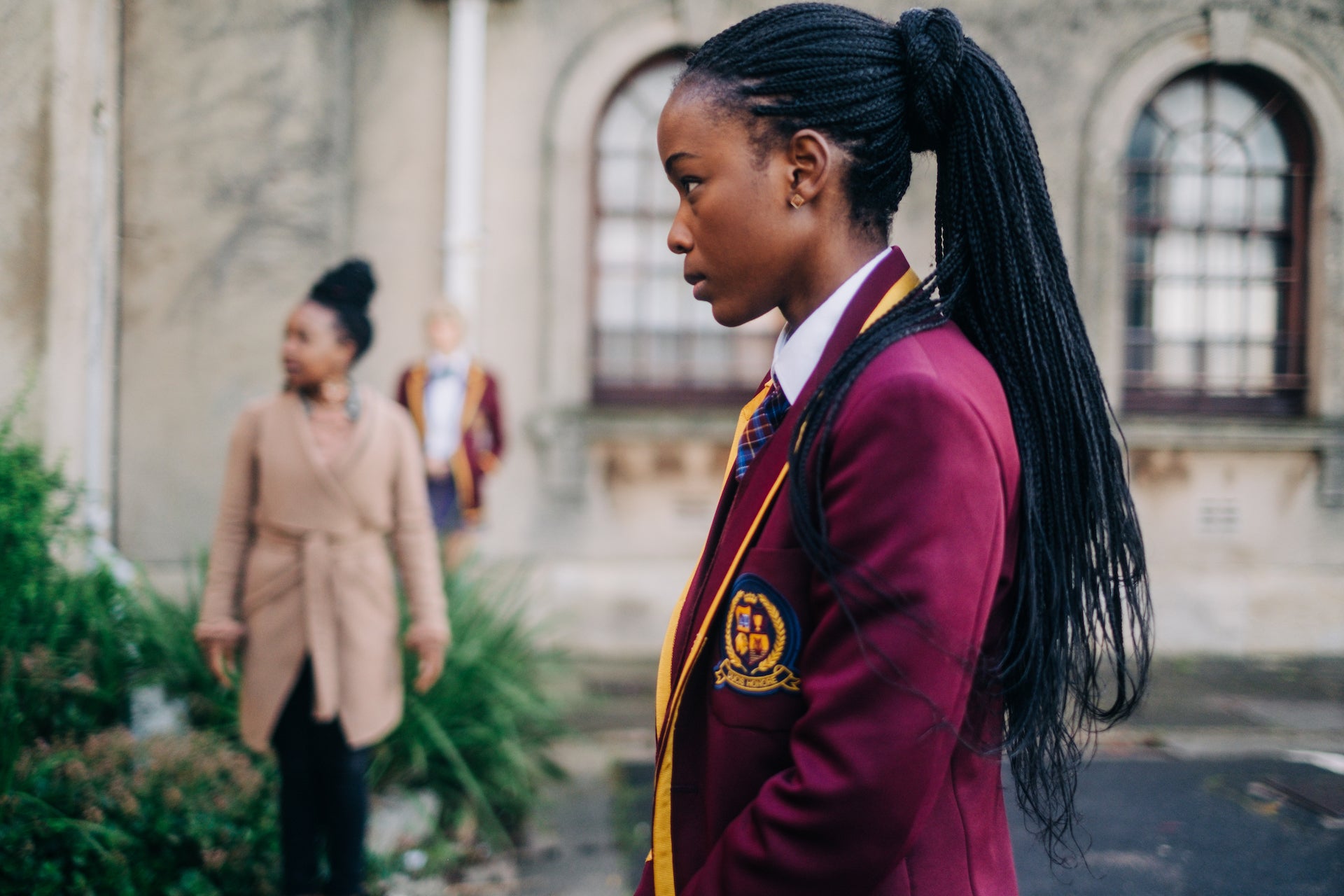
“One, two, three…Nasty C!”
Ama Qamata and Khosi Ngema fall back laughing, marveling at their answer. The two young women, stars of the South African teen drama, Blood & Water on Netflix, had just been asked about their favorite artist from the hit show’s soundtrack and guessed they would land at the same answer. They did.
Nasty C, is the new Def Jam signee that is the light and voice of South African youngins—part of a crop of Gen Z talent that is reshaping the nation’s culture, storytelling and definition of cool. Among that crop of trailblazers is the young cast of Netflix’s second African original series, led by the captivating performances of Qamata and Ngema.
Blood & Water, a coming-of age-mystery drama set among the coastal wealth of Cape Town, follows 16-year-old Puleng Khumalo (Qamata) as she investigates the cold case of her abducted-at-birth older sister. In her investigation, she meets the popular Fikile “Fiks’’ Bhele (Ngema), who she thinks could be her long-lost sibling (Spoiler alert: She is!). But the journey towards the truth takes all six episodes of the addictive first season, unfolding within the walls of a prestigious private school that reveals the lush wealth of South Africa’s elite while also navigating the everyday ups and downs of being a teen.

The kids are caught up in parties and threesomes, unlimited drugs and alcohol, betrayal and intrigue, all while managing school sports, difficult parents and class assignments. It is no wonder the show has been described as the South African Gossip Girl.
“I see why people compare it [to shows like Gossip Girl and Riverdale]. It’s set in a high school with rich kids and it’s kind of showing prestigious high school students,” Qamata told ESSENCE. “But I do think that Blood & Water does have uniquely South African experiences.”
Even though she’s taking this interview at 8 p.m. after a long day of shooting a new TV show, Qamata’s charisma can be felt through the Zoom call from Johannesburg. At 21, she is the older of the two starlets and has the most acting experience, having studied theater and performance at university before booking local shows. Ngema, who is shyer and more soft-spoken, only just made her acting debut when the show launched amid COVID-19 lockdowns.
Suddenly, with Netflix’s 190-country distribution arm, the faces of Ngema and Qamata were in front of millions worldwide, an experience Ngema can’t quite wrap her mind around. “When so many people from all over the world start messaging you, saying how inspired and touched they are by the story…it’s insane,” she said. “People from France, Brazil, Italy as well as locally. They’re really just stanning the show….It is huge because everyone all over the world can relate to the story one way or another.”

The two may play long-lost sisters on TV, but in real life it’s obvious Qamata and Ngema are genuine sister-friends. Take for instance how they banter with each other. They’re prone to finish each other’s thoughts, and even laugh between themselves like no one is watching. Their connection could also stem from the fact that they each identify more with the other’s character rather than their own. Ngema went as far as to audition for the part of Puleng before she was called back to re-audition for Fikile.
“I definitely [identify] with Puleng’s demeanor…sort of being a wallflower, but not really,” Ngema noted. “When I saw Fikile’s part, I thought it was going to be a challenge, but I think towards the end I just found her in me.”
Blood & Water has been a success for Netflix, which chose to order a second season less than a month after the release. The show is part of the larger plan by Netflix to expand its original content from Africa. Earlier this year, the company’s chief content officer Ted Sarandos joined other high-level executives who toured the continent “touting plans to thrust the continent center-stage,” Variety reported. Since that trip, Netflix launched its first African original series, the Pearl Thusi-led by Queen Sono, also set in Cape Town, South Africa. Up next is the animated series Mama K’s Team 4 as well as a slate of programming coming out of Nigeria.

Blood & Water’s renewal for a second season, as well as the global response, is proof that this show — and African content in general — is something that the world is ready to see. Writer-director Nosipho Dumisa, one of the country’s young, bright storytellers, has been able to weave universal themes, but yet keep the story intrinsically South African. One scene that stands out to Qamata is when her brilliant co-star Natasha Thahane’s character, Wendy, questions her white history teacher on why they weren’t learning about African history inside their expensive halls.
“It’s a real thing, especially in spaces like prestigious schools,” Qamata explained. “I know that experience of going to school and questioning why we’re not learning about our heroes in South Africa. Why are we learning more of a western point of view of history?”
Qamata also pointed to the diversity of the cast as another aspect that makes Blood & Water authentic, bringing to life South Africa’s nickname: the Rainbow Nation. “I think that was beautifully done. I’m glad we get to show a different part of Africa than what people are normally used to seeing,” she said. “[The cast] had Black, white, mixed, Indian [actors]. It was a very contemporary viewing of Africa.”
Ultimately for Ngema, the story of Blood & Water shows how Africa is more like the world than it is different. “The whole world can see that we’re all the same really. Teenagers in South Africa go through the same thing as teenagers in Europe,” she said. “But our culture, our South African culture, is so unique. And that’s what makes the story so special.”
"gossip" - Google News
July 16, 2020 at 11:08PM
https://ift.tt/3j9VMnh
'Blood & Water’ Is Being Called A South African 'Gossip Girl' But It’s Far From It - Essence
"gossip" - Google News
https://ift.tt/2QfcAx1
Shoes Man Tutorial
Pos News Update
Meme Update
Korean Entertainment News
Japan News Update

No comments:
Post a Comment